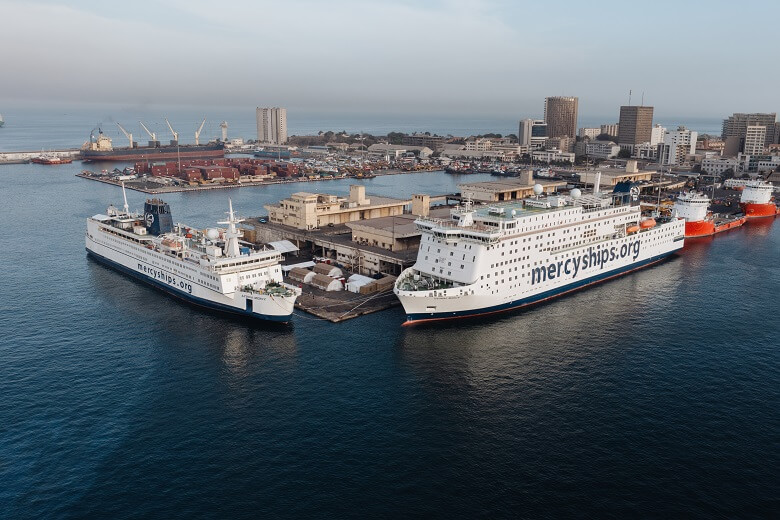Our mission: Bringing Hope and Healing
Who are we?
Mercy Ships is a humanitarian organization that provides more than 4,000 surgical operations and 13,000 dental treatments each year to people without access to such care in developing countries.
By deploying the world’s largest non-governmental hospital ships, the Global Mercy and the Africa Mercy, we deliver high-quality surgical care, primarily on the African continent. At the same time, we work in partnership with host countries to strengthen their healthcare systems sustainably through training programs and the renovation of medical infrastructure.
The challenge: The lack of access to surgery
According to a study published in The Lancet, 5 billion people do not have safe and affordable access to essential surgical care.
A large portion of the world’s population either lives too far from a hospital or lacks the financial means to receive medical treatment. For many, a minor injury can become a life-threatening condition without proper care.
Mercy Ships works in collaboration with governments and the World Health Organization (WHO) to help address this critical challenge.


Our response: Hospital ships
More than half of the world’s population lives near the coast. Our ships make it possible to bring a state-of-the-art hospital directly to port cities, providing a safe, clean, and controlled environment for both patients and volunteers.
The Africa Mercy and the Global Mercy are staffed by 400 to 600 volunteers from around the world. Together, our crews bring hope and healing to thousands of people.
From Immediate Needs to Lasting Impact
Our humanitarian mission is built on two main pillars:
- Responding to the immediate surgical and dental needs of patients.
- Collaborating with host countries to help strengthen their healthcare systems. We offer a wide range of advanced training opportunities for local medical professionals. In 2024, Mercy Ships delivered 159,679 hours of continuing education.
Why Africa?
In West and sub-Saharan Africa, 93% of the population lacks access to surgical care. According to the World Health Organization (WHO), there is an average of two doctors per 10,000 people in these regions, compared to 32 in Europe.
This is why Mercy Ships focuses its humanitarian efforts on the African continent, with the goal of bringing lasting change to healthcare systems.
Our programs
Working with qualified local and international partners, Mercy Ships programs offer global support to developing countries, seeking to make healthcare accessible to all.
Direct medical services
Dental / Oral health
Mercy Ships aims to prevent and reduce the effects of a lack of oral healthcare by providing dental treatment and dental hygiene education and training.
Orthopedic program
Mercy Ships trains local surgeons in Ponseti casting, the “universal standard” in non-invasive clubfoot correction, and provides free surgical intervention for musculoskeletal conditions, neglected orthopaedic trauma and joint diseases. To help maintain correction, Mercy Ships provides physical therapy onboard and also trains local partners in how to manufacture braces.
Plastic Reconstructive Surgery
Birth defects, burns and illness often cause deformities we correct through surgeries; including burn-scar contractures, benign tumours, chronic ulcers, combined fingers and many others.
Ophthalmic care
Our ophthalmic surgeons perform free cataract operations, restoring sight to the blind. Additionally, doctors correct pterygium, strabismus and eyelid deformities and replace painful or disfiguring blind eyes with prostheses. In addition, Mercy Ships trains local surgeons and healthcare professionals, building the capacity of the national eye care system.
Maxillofacial Surgery
Through corrective and reconstructive maxillofacial surgeries, our surgeons relieve deformities caused by physical conditions such as tumours, cleft lip, cleft palate and noma.
Gynecologic surgery
Support and medical care is provided for women who have suffered childbirth injuries. We provide extremely specialised surgery, continuing the recovery process through education and social activities.
General Surgery
Our surgeons reduce the effects of neglected trauma, disease and congenital conditions by providing general surgeries for conditions such as hernias and goiters.
Palliative care
Palliative care is an approach that improves the quality of life of patients and their families facing the difficulties associated with life-threatening illness.
Local medical capacity building programs
Medical infrastructure renovations
Together with local leaders, governments and the national ministries of health, development teams assess healthcare needs in local hospitals and design and implement renovation projects.
Agriculture training – Food for Life
There can only be good health with a good and balanced nutrition.


